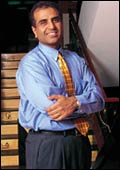 |
| Bharti's Sunil Mittal: New kid on the
BPO block |
When you've got 3 million
customers for your service, and inherent telecommunications strengths,
it may not be all that bad an idea to venture into the go-go business
process outsourcing business. That is exactly what Bharti Enterprises
has done. "We will be among the top three BPO companies in this
country in the next three years," announced Bharti ceo Sunil Mittal,
at a press conference to announce the launch of the company's 50:50
joint venture with the US-based Tele Tech Holdings.
The joint venture,
Tele Tech India, will build a 500 seat centre in Gurgaon at a cost
of Rs 100 crore. The company, which will employ 5,000 agents by
the end of its first year of operations proposes to offer the entire
spectrum of BPO services: from back-office administration to credit
and collection to account maintenance to asset management to infrastructure
support services.
The in-house business will help. "We need
to outsource for better customer service," explains Akhil Gupta,
Joint Managing Director, Bharti Enterprises. "We will be leaving
all our processes to Tele Tech". That could be one reason why
the company expects to break even in its second full year of operation.
However, that isn't all: communications costs account for between
20 per cent and 30 per cent of a BPO outfit's costs. Apart from
being a logical step at forward integration, this could also help
the company increase the efficiency with which it uses its network.
-Suveen K. Sinha
ONEUPMANSHIP
Who's Better, Who's Best?
 |
| S.M. Krishna: A step ahead |
It
is a quiet rivalry that exists between Karnataka Chief Minister
S.M. Krishna and his Andhra Pradesh counterpart. Both aren't averse
to be known as CEOs of their respective states, are business- and
investor-friendly, and want their respective state capitals to be
considered the preferred destination for any technology company
that wishes to invest in India. Naidu's Microsoft connection-Hyderabad
is where the company's development centre is based-gave him the
lead initially, but Krishna has since caught up. Bangalore boasts
a Microsoft Lab apart from Intel and Cisco development centres.
Now, the front-page photo-opp with IBM CEO Sam Palmisano should
give the Karnataka chief minister the lead. Palmisano chose to give
Hyderabad a go-by.
INDOPHILES
The Men Who Sell India Best
Fine, management
guru C.K. Prahalad was the guest of honour at Confederation of Indian
Industry's annual do, but have you wondered about the other men
who sell India best. There's outgoing McKinsey Managing Director
Rajat Gupta, an outspoken salesman for India. Then there's Infosys
co-founder N.R. Narayana Murthy, who has managed to acquire a following
among politicos and businessmen in all parts of the world. Surprising,
isn't it, considering that none of the trio has a background in
sales? Even more surprising? They all have tough day jobs.
Ten
Insights From IRS 2002
The tech magic begins to dim, making old economy
happy.
Literacy no boon to print media
The country's literate population grew by 5.2 per cent, yet readership
grew by a minuscule 0.3 per cent
Dailies better off than magazines
Readership of dailies grew 2 per cent, that of magazines fell
15.2 per cent
Yet, dailies face eroding readership
The ratio of average-issue readership to claimed readership
is down 0.1 per cent
English dailies have come off worst
Seven of the top 10 English publications are magazines
C&S shone, and terrestrial waned
C&S channels gained close to 3.5 crore viewers, terrestrial
television dropped close to 1 crore
Star gained the most; Zee lost the most
Zee's viewership in the general entertainment market dropped
51 per cent
Regional C&S channels face competition
The gap between #1 and #2 in many regional C&S markets narrowed
Clear winners exist in some categories
Aaj Tak (part of the India Today Group that publishes this magazine)
boasts a 58 percentage point lead over #2 Zee News, and Tamil Channel
Sun TV, a 65 per cent lead over Jaya TV
FM rules the roost
The number of FM listeners grew by 1280 per cent; listenership
of non-FM stations dipped 1.5 per cent
The internet remains a niche media
Usage base almost trebled yet the medium's reach is a third that
of FM radio's
-Shailesh Dobhal
|

